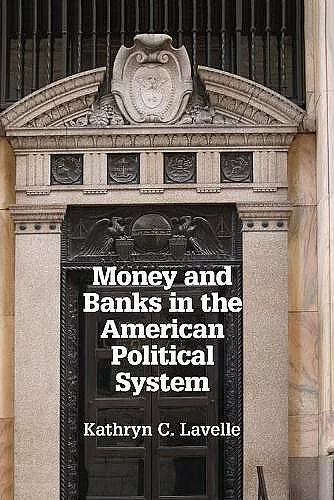Money and Banks in the American Political System
Format:Paperback
Publisher:Cambridge University Press
Published:14th Jan '13
Should be back in stock very soon
This paperback is available in another edition too:
- Hardback£78.00(9781107028043)

Lavelle argues that the political sources of instability in finance derive from the intersection of market innovation and regulatory arbitrage.
Lavelle argues that political sources of instability in finance derive from the intersection of market innovation and regulatory arbitrage. This book explores monetary, fiscal and regulatory policies within a political culture characterized by the separation of business and state, and mistrust of power concentration in one political or economic institution.In Money and Banks in the American Political System, debates over financial politics are woven into the political fabric of the state and contemporary conceptions of the American dream. The author argues that the political sources of instability in finance derive from the nexus between market innovation and regulatory arbitrage. This book explores monetary, fiscal and regulatory policies within a political culture characterized by the separation of business and state, and mistrust of the concentration of power in any one political or economic institution. The bureaucratic arrangements among the branches of government, the Federal Reserve, executive agencies, and government sponsored enterprises incentivize agencies to compete for budgets, resources, governing authority and personnel.
'Why are banks politically powerful in the United States? The novel argument of Lavelle's important book is that banks are powerful because they have allies within the American political system that need banks in order to further their own bureaucratic objectives. For example, the Federal Reserve needs banks to help preserve its independence from the Congress, Congress needs banks to help allocate resources to favored constituents (e.g., homeowners), and financial regulators need banks to help preserve their jurisdictions and budgets. Lavelle's exploration of the bureaucratic politics of financial policy making provides a new understanding of regulation, deregulation, innovation, and crises in American finance.' J. Lawrence Broz, University of California, San Diego
'In this concise volume, Professor Lavelle masterfully dissects and evaluates the politics and institutional drivers of America's evolving banking system. A must-read for political scientists and lawyers alike.' Chris Brummer, Georgetown University
'Lavelle's book usefully illuminates how politically created fragmentation of financial regulation in the United States creates the conditions for recurrent crises. She fills in a huge lacuna in the literature on financial regulation by shifting attention from its effects to its origins and real-world operation in the interaction of Congress and the regulatory agencies.' Herman Schwartz, University of Virginia
'The financial crisis that began in 2008 remains the subject of heated arguments regarding its causes … This new book, grounded in relevant historical developments and guided by a helpful understanding of bureaucratic politics and the distinctive nature of US governments and guided by a helpful understanding of bureaucratic politics and the distinctive nature of US government, brings a refreshingly balanced perspective to the problem. … it sheds light on the most basic causes of US financial instability. Summing up: recommended. Upper-division undergraduate, graduate, research, and professional collections.' M. E. Ethridge, Choice
ISBN: 9781107609167
Dimensions: 228mm x 152mm x 17mm
Weight: 420g
324 pages